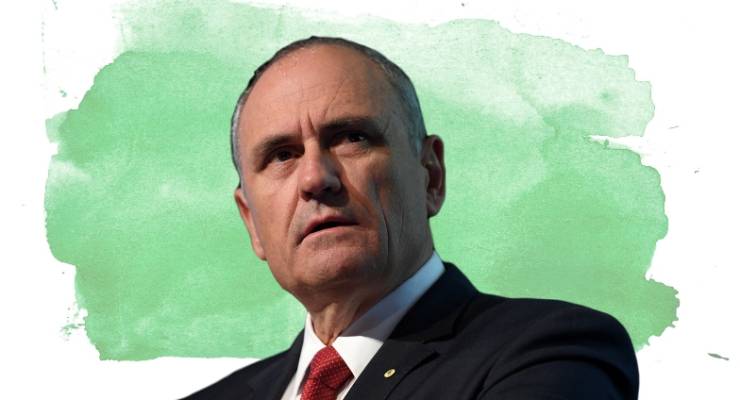
Dr Ken Henry, one of the most highly regarded public servants in Australia, an exemplar of public sector leadership during his time as treasury secretary, seems sure to end his career irrevocably tarred. Henry is singled out in Kenneth Hayne’s financial services royal commission report, which concluded that the National Australia Bank under Henry was slow to act, and seemingly indifferent or unable to grasp the seriousness of the issues it encountered. To be singled out as worse than the other three big banks (knowing what we now know) is damning indeed.
Could this be the same Ken Henry who was one of the key public servants in crafting a policy response that would pull Australia through the Global Financial Crisis? In 2010, Crikey described his policy response in the following terms:
Treasury’s response to the impact of the GFC, coupled with that of the Reserve Bank … stabilised our banking system, kept credit flowing, and launched two waves of stimulus that put a floor under falling consumer confidence and employment. Henry’s advice to Rudd and Swan go hard, ‘go early, go households’ was the playbook for a spectacular policy success … hundreds of thousands of Australians have jobs that wouldn’t have them if Henry, [then Reserve Bank governor Glenn] Stevens and their teams had repeated the errors of the late ‘80s and early ‘90s…
Treasury under Henry, had anticipated the gathering storm and had discretely and assiduously prepared for various crisis scenarios. After Lehman Brothers collapsed and the scale of the problem became clear Henry’s responses were swift, and swiftly implemented with Rudd spending $10.4 billion on his first stimulus package. Henry advised a bank guarantee was needed to secure the country’s financial institutions and Rudd announced it that afternoon. The response from Henry, Rudd, Stevens and then treasurer Wayne Swan pulled Australia through the GFC as well as any developed nation.
Despite years as treasury secretary under Peter Costello, he became a recurring target of Coalition criticism post-GFC over stimulus spending, and batted it away admirably. However, even at the time, he had reputation for responding poorly to criticism. As Crikey noted in May 2009, “Henry isn’t always a fan of public debate … has a decidedly unbureaucratic manner of public speaking and a willingness to have a go at critics…”
Indeed, this reputation only grew worse after he produced the Henry Tax Review — and responded to academic criticism thus:
Whenever an idea is ventured publicly by a person, whether that person is a policy adviser or whether it’s a government minister, there’s at least a handful of academics who will contest it… this is not a partisan comment at all — but for governments, government ministers who are seeking to get ideas legislated — it is unbelievably frustrating, incredibly frustrating … I think there are occasions on which economists might, at least for a period, put down their weapons and join a consensus…
In 2018, when the long called for royal commission finally came, Henry’s appearance in front of the the commission was surreal, discursive and in the circumstances, deeply dismissive and off-putting (“I’ve answered the question the way I choose to answer the question,” he said at one point). Hayne focused on this in particular in his report:
I was not persuaded that NAB is willing to accept the necessary responsibility for deciding, for itself, what is the right thing to do, and then having its staff act accordingly. I thought it telling that Dr Henry seemed unwilling to accept any criticism of how the board had dealt with some issues.
Henry’s response to Hayne’s criticism was more revealing than he intended, perhaps illustrating the commissioner’s point.
Commissioner Hayne said I seemed unwilling to accept criticism of how the board had dealt with some of the issues raised by the commission. I am disappointed that the commissioner formed this view. I know that it is not so.
So what happened to the anticipation, wherewithal and responsiveness Henry displayed as treasury secretary? And what happens to his career from here?








Chastened? More like road kill.
He took the attitudes of the financial sector to the commission and laid them all out.
Yes, I wondered how this Henry could also be that Henry. Good to see it laid out like this. What’s the analysis though? That he was always prickly, resistant to criticism? Or was there something also in his transition from public servant to bank chief? An internalised understanding of himself as a national hero — and therefore above the fray?
Was it more like if you can’t beat em – join em? During the GFC was he saving the economy or saving the banks? One of your better pieces, Charlie.
Maybe he was just more honest than the others.
Having the scales clawed from my eyes watching Henry’s performance at the RC was a bit painful. Y’know, the guy went out to help the endangered hairy nosed wombat when he was Treas Sec, so cool. Apart from being tarred, the addition of feathers and being run out of town like King and Duke in Huckleberry Finn seems only fair.